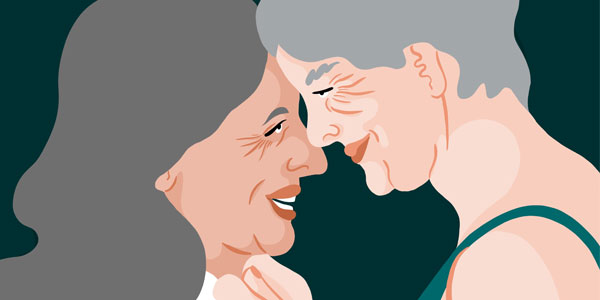
Older people do bonk
- Beth Amato
The notion that people older than 50 neither desire nor engage in sexual intercourse is a misnomer that demands further research, particularly in Africa.

Many of us express a strong aversion to imagining our parents having sex. It’s an awkward thought that must be dismissed as quickly as possible. Why do we feel so uncomfortable thinking about grannies and grandpas enjoying some time beneath the sheets? We express disbelief that men over 50, for example, can have erections or that women past reproductive age are erotic beings, beyond fetishising them as predatory ‘cougars’.
This discomfort has deep-seated roots, with implications for gender and sexual diversity and more importantly for public health.
Sexual silence
Catherine Burns, Associate Professor of Medical History and Ethnography at Wits University, explains that gender and sexuality theory on ageing populations is sparse – globally, and particularly in southern Africa. This dearth reflects the ignorance and taboos around sexuality in older people.
“Sylvia Tamale [African feminist, scholar and lawyer] was one of the first theorists to expand our notion of what sexuality means in this region, across age categories and ethnicities, drawing especially from the Global South,” says Burns.
In Burns’ own historical work, Sex Lessons from the Past, she reveals that there were many ways in which people expressed themselves sexually that were appreciated and valued. Fertility and childbearing were not the only ways sex was socially acceptable. Burns points out that Tamale’s recent research also shows that communities across Africa contain ‘multiple sexualities’, and that this is key to carrying out meaningful research on gender and sexuality today.
“We must see beauty across a life spectrum. Ageism sees older people as undesirable. Mostly, we must transcend our notions of what it means to be a sexual being, otherwise we could fall into the trap of binary and split thinking,” she adds.
Much of the research around sexuality in SA has focused on younger people. A lot of this research focuses on sexual and reproductive health, and the risks associated with sex, including the transmission of HIV/Aids.
Dangerous liaisons
However, studies emanating from a rural community in Mpumalanga show that people older than 50 were contracting as well as transmitting HIV, were not using protective measures like condoms, and had multiple partners. But preventative HIV and Aids messaging was either absent or inappropriate for an older group.
Professor Kathleen Kahn and Dr Chodziwadziwa Kabudula, in the South African Medical Research Council/Wits Rural Public Health and Health Transitions Research Unit (Agincourt) at the Wits Rural Campus were part of the team that conducted the research into HIV/Aids among older people. Their findings suggest that prevention initiatives tailored to the needs of older adults are urgently needed to reduce HIV risk.
“At first we thought that older people had lived with HIV for a long time, but we soon discovered that they were contracting it later in life. This surprised us as there was a dearth of evidence on HIV acquisition and transmission in older people. Our study is one of the first to delve into these matters,” says Kabudula.
Rewriting the geriatric sex script
In 2010, a cohort of 1 360 adults over 40 were tested for HIV. Five years later, 33 people who tested negative in 2010, tested positive in 2015. The rate for women was double that of men.
“Essentially we have to go back to the drawing board in terms of the prevention messages and campaigns we have. We can’t just transplant the messaging we have for younger people,” notes Kahn.
Kahn says that older people acquiring HIV and Aids in rural communities has consequences for the caregiving of younger and other older people. Younger people often leave the rural areas in search of work, and older women in particular step into primary caregiving roles.
“It’s a matter of priority to ensure that we don’t ignore the older age groups. We have found that older people are more likely to test at home with self-testing kits than at clinics. This is something that could be incorporated into awareness campaigns and interventions for older people,” she says.
Burns notes that older people have been excluded from a lot of clinical research, and this is why the study at the Wits Rural Campus is so important.
In her book Researching and theorizing sexualities, Tamale says that we cannot make homogenised assumptions about African sexualities. Indeed, the idea that older people can’t have sex is among other common and restrictive stereotypes with negative consequences, including misconceptions such as:
- Human beings engage in sex for reproductive purposes only,
- He is a man and therefore desires only female sexual partners,
- She wears a religious veil and is therefore sexually submissive, and
- She is menopausal and is therefore asexual.
Older people’s sexual dreams and fears should be less shrouded in shame, mirth and silence. Leave ageism behind with all the other ‘isms’.
- Beth Amato is the Communications Manager at the African Centre for the Study of the United States at Wits University.
- This article first appeared in Curiosity, a research magazine produced by Wits Communications and the Research Office.
- Read more in the 13th issue, themed: #Gender. We feature research across disciplines that relates to gender, feminism, masculinity, sex, sexual identity and sexual health.

